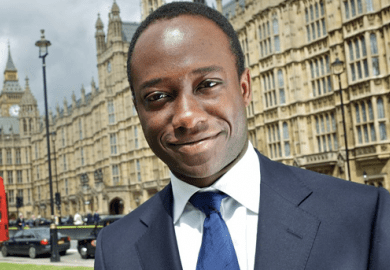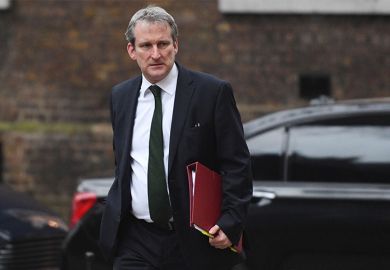The appointment of two new education ministers has paved the way for a more radical review of English higher education funding, while universities should expect to remain in the spotlight over issues such as free speech and vice-chancellor pay, policy experts have predicted.
Nick Hillman, director of the Higher Education Policy Institute, said that any potential obstacles to the government’s “major review” of university funding, which was announced by prime minister Theresa May last year, “have probably disappeared” since Sam Gyimah replaced Jo Johnson as universities minister in the UK’s Cabinet reshuffle this week.
Reports have suggested that Mr Johnson and former education secretary Justine Greening, who was replaced by Damian Hinds, were both kept in the dark about the funding review and were opposed to it, having instead defended the status quo of £9,250 fees.
“I think a big and bold review is now more likely than it seemed a week ago,” Mr Hillman said. “It will be hard, even if Sam wanted to – and I have no evidence that he does want to – for him to block that.”
He added: “Jo actually owed his position as a minister to David Cameron…Sam Gyimah will be in a slightly different position in that he will owe his position entirely to Theresa May…so he will probably be a bit more No 10’s person in the education department than Jo Johnson has been in recent times.”
Mr Hillman added that it would be “extraordinary” if the planned knowledge exchange framework, first announced by Mr Johnson in October, would be “near the top of Sam Gyimah’s in tray”, given that it was a “bit of a gimmick”.
But he suggested that the former prisons minister is likely to focus on many of the same issues that were priorities for his predecessor “because they chime with a wider Conservative approach to universities around value for money and competition”. These include concerns around cross-subsidies from lower-cost courses to higher-cost courses and greater transparency over the use of tuition fees, he said.
Higher education in general will continue to “be in the spotlight in a way that it’s not quite yet used to” under the new ministers, he added, “because people are aware that universities are now operating in a market environment in a way they weren’t before [and] they’re aware that their children are getting in large debts to attend university”.
Mr Johnson sparked a national debate in June when he criticised the pay awards of Russell Group vice-chancellors and has also criticised the “no-platforming” of controversial speakers on university campuses.
Andy Westwood, professor of government practice at the University of Manchester, said that the Conservatives’ 2017 general election manifesto, which included the major funding review and called for a greater focus on technical education, “still offers the closest guide to what Theresa May wants from education and from new ministers Damian Hinds and Sam Gyimah”.
He said that “everything is on the table” regarding the funding review – it could affect “fees, loans, grants, the size and shape of the sector” – and there are “now additional political tests” for the new ministers.
“After the general election result, education needs to be less politically toxic for the Conservatives, so whether it’s fees and interest rates in higher education or school funding formulas, Hinds and Gyimah will be expected to win support for policy changes among the wider voting public, who tend to like grammar schools and, after recent months, to be quite sceptical about universities,” he said.
“I don't see the high profile of universities changing anytime soon or the headlines around fees, interest rates, vice-chancellor pay and so on – although I suspect that new ministers may be a little less gung-ho on free speech post-Toby Young.”
Mr Young, a controversial journalist, resigned from the board of the Office for Students this week after his appointment was heavily criticised in a fiery parliamentary debate. Mr Johnson had robustly defended the appointment.
Register to continue
Why register?
- Registration is free and only takes a moment
- Once registered, you can read 3 articles a month
- Sign up for our newsletter
Subscribe
Or subscribe for unlimited access to:
- Unlimited access to news, views, insights & reviews
- Digital editions
- Digital access to THE’s university and college rankings analysis
Already registered or a current subscriber?








